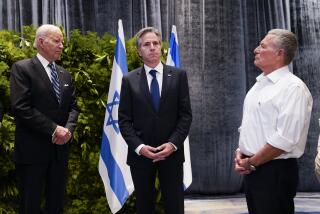Iraq’s Time Is Running Out, White House Officials Say
WASHINGTON — White House officials signaled Saturday that time is running out for Iraq to comply with U.N. weapons inspections and that they are prepared to take military action unless Iraqi President Saddam Hussein cooperates fully with the U.N. mission.
President Clinton met Saturday evening with Secretary of State Madeleine Albright, Defense Secretary William S. Cohen and National Security Advisor Samuel R. “Sandy” Berger to discuss the situation and a U.S. response.
“We want to make sure that the Iraqis know that we do not consider the situation to be an acceptable one and that we will not allow this situation to go on indefinitely,” said a senior Clinton advisor who attended the meeting.
No final decision on the use of military force--or any other of the options available to the president--was made at the meeting, the advisor said. He also explained that diplomatic solutions are still being considered.
But in what has become one of a familiar series of steps in disputes with Hussein, the U.S. is now signaling that the standoff is on a direct path toward armed conflict if peaceful efforts fail to persuade Iraq to allow weapons inspectors to enter sites suspected of housing evidence of chemical or biological weapons.
The meeting came one day after Richard Butler, the chief U.N. weapons inspector, told the U.N. Security Council that his talks earlier in the week with Iraqi officials had failed to bring about compliance. “It’s clear that the answers that the Iraqis gave to Butler were unacceptable,” the senior official said.
In a blunt report to the Security Council, Butler said the Iraqi resistance threatens the world body’s entire program for dismantling Baghdad’s weapons of mass destruction.
During the hourlong White House meeting Saturday, the president was given a sense of the flavor of Butler’s meetings in Baghdad and the reactions of the Security Council to those talks.
The talks in Baghdad, the senior advisor said, “were quite gloomy.” Not only “was he rebuffed on the specifics, but the tone was extremely confrontational,” he said.
Iraqi Deputy Prime Minister Tarik Aziz refused to permit the inspectors to go anywhere they believe they need to go to conduct their missions, which was a Security Council demand relayed by Butler.
Aziz also requested a three-month moratorium on attempted inspections of sensitive facilities. Those include compounds the Iraqis say are off limits because they are “presidential palaces,” a description U.N. inspectors believe is little more than an attempt to shield them from search.
The president’s advisors consider Butler’s reception “one of the worst” given by the Iraqis to a high-level emissary of the United Nations, indicating an increasing intransigence.
White House officials said that over the next few days, administration officials will be in close contact with the other countries on the Security Council and U.S. allies in the Persian Gulf region as they move toward a response.
*
The Security Council, meanwhile, is expected to develop a formal response to the latest Iraqi challenge later this week. There is still no consensus among council members for a military strike against Iraq. The U.N. ambassadors from Russia and China, which are more sympathetic than the U.S. to Iraq, have cautioned against military action.
The cease-fire pact at the end of the Persian Gulf War required that Iraq dispose of its chemical, biological and nuclear weapon capability and its long-range missiles. During Butler’s visit to Baghdad, Aziz repeated Iraq’s contention that it has eliminated all its illegal weapons.
The senior advisor said that the allegations of a sex scandal shaking the White House have not had an effect on the foreign policy apparatus in the administration.
“There’s a kind of hermetically sealed little part of our world,” the advisor said.
Besides, he added, the issues that the foreign policy team is confronting--such as the crisis in Iraq--are so serious that they make it easy for officials not to be distracted.
More to Read
Sign up for Essential California
The most important California stories and recommendations in your inbox every morning.
You may occasionally receive promotional content from the Los Angeles Times.










